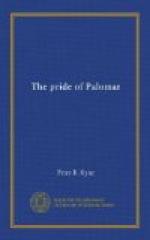Panchito, it appears, is a five-year-old, bred by Michael J. Farrel, whose post-office address is El Toro, San Marcos County, California. He is bred in the purple, being a descendant of Duke of Norfolk and, according to his present owner, Don Quixote, he can run circles around an antelope and has proved it in a number of scrub races at various fiestas and celebrations. According to Don Quixote, his horse has never hitherto appeared on a public race-track. Panchito knows far more about herding and roping steers than he does about professional racing, and enters the list with no preparation other than the daily exercise afforded in bearing his owner under a forty-pound stock saddle and scrambling through the cactus after longhorns. Evidently Don Quixote knows it all. He brushed aside with characteristic Castilian grace some well-meant advice tendered him by his countrymen, who have accumulated much racing wisdom since the bang-tails have come to Tia Juana. He spent the entire day yesterday telling everybody who understands Spanish what a speed marvel is his Panchito, while Sancho Panza, Junior, galloped Panchito gently around the track and warmed him in a few quarter-mile sprints. It was observed that the cactus burrs were still decorating Panchito’s tail and mane.
Don Quixote is a dead game Mexican sport, however. He has a roll that would choke a hippopotamus and appears willing to bet them as high as a hound’s back.
Figure it out for yourself. You pays your money and you takes your choice. Bobby Wilson, the handicapper, says Don Quixote smokes marihuana, but the jefe politico says he knows it’s the fermented juice of the century plant. However, Bobby is taking no chances as the wise ones will note when they check the weights. Panchito, being a powerful horse and (according to Don Quixote) absolutely unbeatable, faces the barrier with an impost of 118 pounds, not counting his shoes, cactus burrs and stable accumulations.
Watch for Sancho Panza, Junior. He rides barefooted in a two-piece uniform, to wit, one “nigger” shirt and a pair of blue bib overalls, and he carries a willow switch.
Viva Panchito. Viva Don Quixote. Ditto Sancho Panza, Junior.
John Parker finished reading and his glance sought Leighton’s. “Danny,” he informed the trainer in a low voice, “here is what I call a dirty, low, Irish trick. I suppose he’s been making a night-bird out of Panchito, but you can bet your last nickel he isn’t neglecting him when they’re alone in the barn together. He gets a grooming then; he gets well fed and well rubbed and the cactus burrs and the stable accumulations are only scenery when Panchito’s on parade. He removed the racing plates you put on Panchito and substituted heavy work shoes, but—Panchito will go to the post with racing plates. I think we had better put a bet down on him.”
“I wouldn’t bet tin money on him,” Danny Leighton warned. “He can outrun anything in that field, even if he has broken training a little, but those wise little jockeys on the other horses will never let him win. They’ll pocket him and keep him there.”




